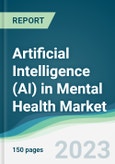Mental illness remains a significant global public health issue, affecting millions of individuals worldwide. Despite the challenges posed by limited access to mental healthcare, stigma, and resource constraints, the integration of artificial intelligence (AI) technologies offers a promising future for mental health care. The AI in the mental health market is experiencing growth due to rising cases of depressive disorders, schizophrenia, and other psychotic disorders. According to the World Health Organization (WHO), approximately 4.4% of 10-14-year-olds and 5.5% of 15-19-year-olds suffer from anxiety disorders.
Drivers of the Artificial Intelligence (AI) in the Mental Health Market:
- Increased Mental Health Awareness and Reduced Stigma: The growing prevalence of mental disorders is a significant factor driving the AI in mental health market. WHO reports that one in seven individuals aged 10-19 experiences a mental disorder, accounting for 15% of the global disease burden in this age group. Suicide ranks as the third leading cause of death among those aged 15-29 years. This escalating mental health crisis has created societal challenges, including substance use disorders; in 2022, 7.74% of adults in the U.S. reported having a substance use disorder.
Geographical Outlook of the Artificial Intelligence (AI) in the Mental Health Market:
- Significant Growth in the United States: The AI in mental health market is witnessing remarkable growth in the United States due to several key drivers, including an increasing prevalence of mental health disorders, advancements in AI technologies, and growing acceptance of telehealth solutions. The rise in issues such as anxiety, depression, and PTSD has created an urgent need for effective treatment options. The COVID-19 pandemic exacerbated these challenges, leading to a surge in demand for mental health services as individuals sought help during heightened stress and uncertainty.
Reasons for buying this report:
- Insightful Analysis: Gain detailed market insights covering major as well as emerging geographical regions, focusing on customer segments, government policies and socio-economic factors, consumer preferences, industry verticals, other sub-segments.
- Competitive Landscape: Understand the strategic maneuvers employed by key players globally to understand possible market penetration with the correct strategy.
- Market Drivers & Future Trends: Explore the dynamic factors and pivotal market trends and how they will shape up future market developments.
- Actionable Recommendations: Utilize the insights to exercise strategic decision to uncover new business streams and revenues in a dynamic environment.
- Caters to a Wide Audience: Beneficial and cost-effective for startups, research institutions, consultants, SMEs, and large enterprises.
What do businesses use our reports for?
Industry and Market Insights, Opportunity Assessment, Product Demand Forecasting, Market Entry Strategy, Geographical Expansion, Capital Investment Decisions, Regulatory Framework & Implications, New Product Development, Competitive Intelligence.Report Coverage:
- Historical data & forecasts from 2022 to 2030
- Growth Opportunities, Challenges, Supply Chain Outlook, Regulatory Framework, Customer Behaviour, and Trend Analysis
- Competitive Positioning, Strategies, and Market Share Analysis
- Revenue Growth and Forecast Assessment of segments and regions including countries
- Company Profiling (Strategies, Products, Financial Information, and Key Developments among others)
Artificial Intelligence (AI) in mental health market has been segmented as following:
- By Technology
- Machine Learning
- Natural Language Processing (NLP)
- Deep Learning
- Computer Vision
- Others
- By Application
- Diagnosis And Treatment
- Virtual Assistants and Chatbots
- Mental Health Monitoring
- Predictive Analytics
- Others
- By End-User
- Hospitals And Clinics
- Mental Health Centers
- Research Institutions
- Others
- By Geography
- North America
- United States
- Canada
- Mexico
- South America
- Brazil
- Argentina
- Others
- Europe
- United Kingdom
- Germany
- France
- Spain
- Others
- Middle East and Africa
- Saudi Arabia
- UAE
- Israel
- Others
- Asia Pacific
- Japan
- China
- India
- South Korea
- Indonesia
- Thailand
- Others
- North America
Table of Contents
Companies Mentioned
- Google Llc (Alphabet Inc.)
- Microsoft Corporation
- IBM Corporation
- Amazon Web Services (AWS)
- Intel Corporation
- Cogito Corporation
- Ginger.io Inc. (Headspace Health)
- Woebot Health
- Pear Therapeutics, Inc.
- HopeLine.ai
- Wysa Ltd
Table Information
| Report Attribute | Details |
|---|---|
| No. of Pages | 150 |
| Published | January 2025 |
| Forecast Period | 2025 - 2030 |
| Estimated Market Value ( USD | $ 3.26 Billion |
| Forecasted Market Value ( USD | $ 7.2 Billion |
| Compound Annual Growth Rate | 17.1% |
| Regions Covered | Global |
| No. of Companies Mentioned | 11 |









